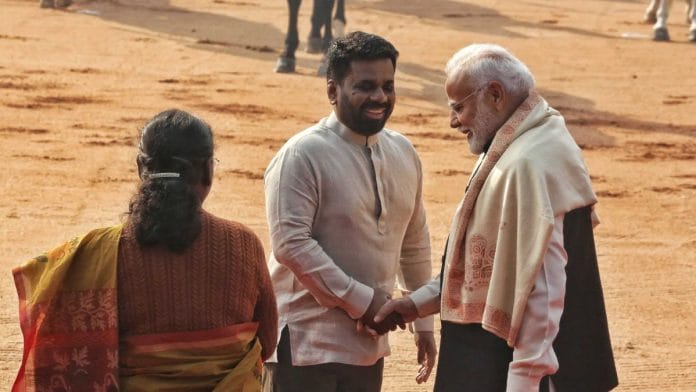New Delhi: Sri Lankan territory will not be used “in any way, in a manner which is detrimental to India”, assured President Anura Kumara Dissanayake during his bilateral meeting with Prime Minister Narendra Modi Monday. This assurance comes at a time when India has been worried over Chinese research vessels berthing at ports in the island country as they continue to survey across the Indian Ocean region.
Dissanayake, is on a three-day visit to India, his first foreign visit, from 15 December to 17 December. He was elected to power in September this year, while his party the National People’s Power, was elected with a large majority in the Parliament in November.
Last December, Colombo, had issued a moratorium for one year, starting 1 January, 2024, for all research vessels from berthing at its ports after repeated concerns raised by New Delhi.
The information gathered by Chinese research vessels has both civil and defence purposes. In October 2023, the Chinese research vessel Shiyan 6, had made a port call at Colombo, months before the moratorium was issued.
External affairs minister S. Jaishankar called on the Sri Lankan president Sunday evening, while Dissanayake received a ceremonial welcome Monday morning at the forecourt of Rashtrapati Bhavan by President Droupadi Murmu and Modi. Dissanayake paid respects to Mahatma Gandhi at Rajghat earlier in the morning.

The Sri Lankan president also talked about finding a solution soon to the issue of fishermen and fishing rights, which he called a “plague” on the ties between the two countries.
“We also want to find a durable and sustainable solution to the fisherman’s issue that has become a plague for both our countries. There are bottom trawling systems being adopted by the fishermen in that area and that needs to be put an end to because it will spill doom to this industry. We requested Prime Minister [Narendra Modi] to put an end to practices that are detrimental to the industry and the people,” said Dissanayake during a statement to the press.
In 2024, Sri Lanka arrested 535 Indian fishermen and detained 71 fishing boats, which is a jump from 240 arrests in 2023, and the seizure of 35 boats. Around 395 fishermen have been released and repatriated to India from Sri Lanka this year, according to information published by the Ministry of External Affairs in the Parliament of India. There are about 140 Indian fishermen in Sri Lanka custody till date.
“We also discussed issues related to the livelihood of fishermen. We agreed that we should move forward with a humane approach in this matter,” said Prime Minister Modi in his statement to the press.
Before Dissanayake’s arrival, Thol Thirumavalavan, the Indian Member of Parliament representing Chidambaram, had raised the issue of Tamilian fishermen in custody across the border, requesting a solution to bottom trawling, indicating the domestic nature of the issue.
Also read: Sri Lanka has arrested ‘nearly 500’ Tamil Nadu fishermen this year, twice as many as in 2023
Defence, energy ties discussed
Defence, energy, including renewable energy, and connectivity also figured in the talks between Dissanayake and Modi. The Indian Prime Minister described the “physical, digital and energy connectivity” as important pillars of ties between India and Sri Lanka.
“Work will be done on establishing electricity grid connectivity and multi-product petroleum pipelines between the two countries. Sampur Solar Power Project will be accelerated. Also, LNG will be supplied for Sri Lanka’s power plants,” said Modi in a statement.
He added: “We have decided to finalise the defence cooperation agreement soon. Agreement has also been reached on cooperation on hydrography. We believe that the Colombo Security Conclave is an important platform for regional peace, security and development.”
In terms of physical connectivity, Modi announced that the two sides are working on creating a new ferry service between Ramanathapuram and Talaimannar, after the opening of the Nagapattinam-Kankesanthurai ferry service.
However, Modi also raised the issue of rights of Tamils in Sri Lanka, saying, “We also talked about reconstruction and reconciliation in Sri Lanka. We hope that the Government of Sri Lanka will fulfill the aspirations of the Tamils and fulfill its commitment to full implementation of the Constitution of Sri Lanka, and holding Provincial Council Elections.”
This is in reference to the 13th amendment to the Sri Lankan constitution, which was backed by India, which would see political autonomy for Tamils in Sri Lanka, through provincial council and the devolution of power.
Dissanayake and his party the National People’s Power has, in the past, been against the 13th amendment.
In recent years India has become pivotal to the financial security of Sri Lanka, extending loans worth $4 billion in 2022, after the island country declared bankruptcy. India’s loans helped Colombo eventually work out a deal with the International Monetary Fund (IMF).
Dissanayake said that he thanked India for its financial support and hoped to see a deepening of the technical cooperation discussed by the two leaders.
Also read: Ports, grants, defence to detained fishermen, key takeaways from Jaishankar’s visit to Sri Lanka






